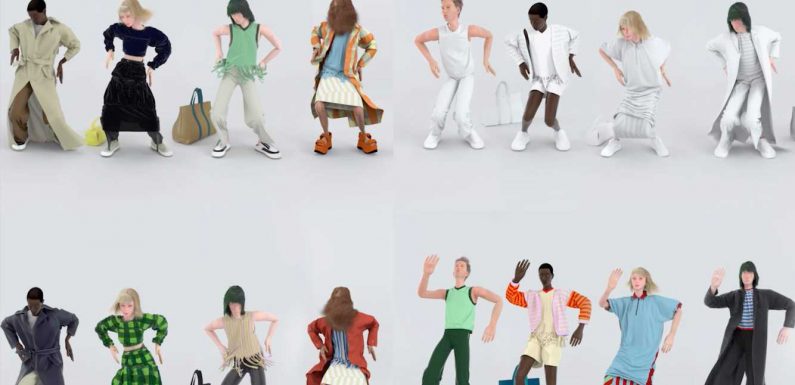
MILAN — The importance of digitalization and virtual reality grew throughout 2020, but they are only at the dawn of their potential for the fashion industry.
So far, designers and companies toyed with these tools mainly to enhance their online stores or to conceive alternative formats to present their collections, but new initiatives have proved they can offer opportunities to efficiently retool other steps in the creative process and across the supply chain.
A pool of brands, for one, has started to experiment with technologies to improve their sustainable performance, banking on VR-enhanced projects and virtual 3D sampling to test consumers’ real sentiment and the demands of the market before producing collections. This approach addresses ongoing challenges for the industry, like reducing environmental impact and waste, as well as optimizing the deployment of raw materials, budgets and workforce.
A forerunner in Milan, Sunnei eyed the concept in July, when it launched the Canvas customization initiative aimed at enabling the brand’s wholesale partners to build their own collections based on their unique needs.
Available at a dedicated VR-enhanced platform, Canvas offered 30 select retailers the chance to customize 50 genderless carryover pieces including ready-to-wear and accessories such as handbags, footwear and costume jewels, for a total of 1,200 options. The Canvas’ five-step customization program also gave buyers the opportunity to differentiate their assortment from competitors’ by changing a few design details, such as the length of sleeves on shirts, fabrics and colors, and even things like dyeing and stitches.

Related Gallery
Men’s Spring 2021 Fashion Collections: The Great Outdoors
More than a business-to-business tool Canvas has also served to enrich the narrative and reiterate brand values, as evidenced by a catchy video Canvas made its debut during Milan Fashion Week in July. For the dynamic presentation, designers developed avatars of male and female models that danced to the tune of Nineties Latin pop hit “Macarena,” in a fresh format that ticked the entertainment and consumer engagement boxes.
A frame from the video Sunnei released for its “Canvas” project. Courtesy of Sunnei
More recently, Sergio Rossi took the concept a step further and directly to customers, launching a virtual collection for the holiday season. In particular, the range focused on the Godiva pump featuring a V-neck back and ankle strap. Consumers could preorder the style on the Sergio Rossi website after browsing a catalogue of rendered designs and different color options.
The company said the Godiva initiative saved roughly 30 percent in costs related to manufacturing samples. It was Sergio Rossi’s first effort at using technology to implement zero-impact production and part of the brand’s larger plan to introduce tech tools in different stages of the manufacturing chain, from stylistic creation to prototyping.
“The challenge of tomorrow is to combine business development with the need to adopt sustainable policies in environmental and social matters, the only concrete way to continue to reach important results,” said Sergio Rossi chief executive officer Riccardo Sciutto.
A rendering of Sergio Rossi’s Godiva pump. Courtesy of Sergio Rossi
As for customers, the pandemic surely accelerated their familiarity with digital platforms and VR/AR tools. While the touch-and-feel experience remains essential for many shoppers, the appetite and attention for avatars and virtual doppelgangers of products peaked last year, triggered by the entertainment and gamification aspects that accompany these projects.
Last month ComplexLand offered a unique, immersive experience combining exclusive product drops, panel discussions and performances. Attendees — who were able to craft their own avatar and virtual outfit — racked up a total of 3.2 million total minutes at ComplexLand, 9.5 million interactions between attendees and 1.9 million commercial interactions across different vendors across the week, according to Complex.
Endeavoring to seize the business opportunities the cross-pollination of virtual design, AI and data might bring, more startups have been popping up recently to aid brands with their tech activations.
Among these, Impossible Brands launched with the mission of supporting Made-in-Italy emerging labels in designing, developing and presenting virtual collections, before starting the focused, artisanal production of the goods.
Founded by Alessandro Botteon, Anastasiia Masiutkina D’Ambrosio and Edoardo Di Luzio, the company coordinates the full “virtual to reality” process: it has an in-house team of fashion designers, 3D artists and AR experts creating the virtual samples, while it counts on a network of local suppliers for the physical manufacturing.
In particular, production is based on data gathered on consumers’ preferences and reactions to product avatars or filters, like the ones the company designed to launch the Ama label of bags in the U.S. last month.
https://www.instagram.com/p/CH-sZnNCWO0/
A post shared by AMA Bags (@ama_bag)
Source: Read Full Article

